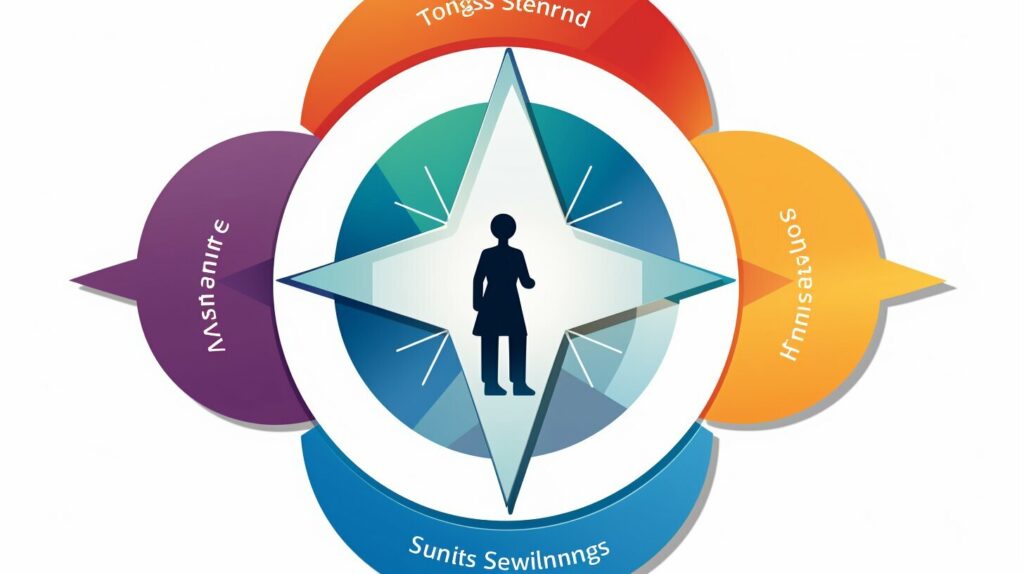What are the 3 elements of leadership skills? As an expatriate leader, I have come across various successful leaders throughout my career. Through my experiences, I have learned that effective leadership skills are a crucial component of achieving success in any organization or role.
To become a strong leader, it is essential to understand the three key elements that contribute to leadership skills. By developing these elements, you can become a more influential and impactful leader.
Through this article, I will explore what are the 3 elements of leadership skills. By the end of this article, you will have a fundamental understanding of how to enhance your leadership skills, inspire your team, and achieve your goals.
Key Takeaways:
- Effective leadership skills are essential for success in any organization.
- Developing the three key elements of leadership skills can enhance your leadership abilities.
- Leadership development is a continuous process that requires commitment and self-reflection.
The Importance of Leadership Skills
I understand the significance of effective leadership skills. Leaders play a vital role in guiding and inspiring their teams, driving organizational success, and creating a positive work culture. In today’s fast-paced and complex business environment, effective leadership skills are more critical than ever before.
Developing leadership skills is a continuous process that requires commitment and self-reflection. Leaders must possess a range of attributes, including vision, communication, collaboration, adaptability, and resilience. Leadership development programs can help individuals enhance their skills and unlock their full leadership potential.
Knowing what are the 3 elements of leadership skills is essential for achieving individual and organizational goals. Effective leaders inspire trust and confidence, build strong relationships, foster innovation, and drive exceptional results.
By cultivating leadership skills, individuals can become more influential and successful leaders, creating a lasting impact in their organizations and beyond.

“The function of leadership is to produce more leaders, not more followers.” – Ralph Nader
Element 1: Vision and Purpose
What Are the 3 Elements of Leadership Skills? In order to be an effective leader, having a clear vision and purpose is crucial. As a leader, I must possess a strong sense of direction and be able to communicate it to my team with passion and conviction.
By setting clear goals and aligning them with a larger purpose, I can inspire my team to work towards a common objective.
A strong leader possesses leadership traits such as charisma, confidence, and determination. These attributes enable me to inspire trust and loyalty in my team, as they know that I am working towards a shared vision that will benefit everyone involved.
| Leadership Qualities: | Leadership Attributes: |
|---|---|
| Charisma | Confidence |
| Determination | Passion |
| Visionary thinking | Proactivity |
As a leader, my vision and purpose must be constantly evolving to stay relevant and meet the needs of my team and organization. By staying flexible and open to new perspectives, I can maintain a clear vision and inspire my team to work towards a common goal.

“The very essence of leadership is that you have to have vision. You can’t blow an uncertain trumpet.” – Theodore Hesburgh
Element 2: Communication and Collaboration
Effective communication and collaboration are two critical leadership characteristics that define successful leadership. As a leader, I understand that communication is the key to conveying ideas, expectations, and feedback to team members.
It is essential to communicate clearly and consistently, both verbally and in writing, to ensure everyone is on the same page. This also entails being an active listener, encouraging open dialogues, and providing timely feedback.
Besides communication, collaboration is equally important in leadership. Leaders must work collaboratively with their teams, create an environment where people feel comfortable sharing ideas, and seek input from diverse perspectives.
Collaboration enables teams to work together towards common goals and fosters a sense of ownership and accountability amongst members.
Collaboration and communication can help a team operate effectively, leading to better decision-making, improved problem-solving abilities, and faster execution. As Peter Drucker famously wrote, “The most important thing in communication is hearing what isn’t said.”

Element 3: Adaptability and Resilience
Adaptability and resilience are essential qualities for effective leadership. In today’s fast-paced and ever-changing business landscape, leaders must be adaptable to evolving circumstances and embrace innovation.
They need to navigate challenges with resilience, demonstrating the ability to bounce back from setbacks and motivate their team to persevere. Successful leaders possess the capacity to adjust strategies, embrace change, and inspire confidence in the face of adversity.
Leaders who lack adaptability and resilience may struggle to keep up with the pace of change, become overwhelmed by obstacles, and fail to motivate their team through difficult times. However, leaders who embrace these qualities set a positive example for their team and foster a culture of adaptability and resilience.
One way leaders can cultivate these qualities is by modeling a growth mindset. This involves embracing challenges as opportunities for learning and growth, seeking out feedback to continuously improve, and maintaining a positive attitude in the face of obstacles.
Leaders who model a growth mindset inspire their team to adopt a similar approach, which can help build a culture of resilience and adaptability.

“Resilience is not what happens to you. It’s how you react to, respond to, and recover from what happens to you.” –Jeffrey Gitomer
Another way leaders can develop adaptability and resilience is by seeking out diverse perspectives and experiences. By listening to the viewpoints of others and exposing themselves to new ideas, leaders can broaden their understanding and build the flexibility needed to adapt to new situations.
Ultimately, adaptability and resilience are vital qualities for leaders seeking to achieve long-term success. By cultivating these qualities, leaders can navigate challenges with confidence, inspire their team to persevere, and create a culture of innovation and growth.
The Importance of Developing Leadership Skills
As a professional, I understand the significance of cultivating effective leadership skills. These skills are essential for guiding and inspiring teams, driving organizational success, and creating a positive work culture.
It is important to invest time and effort into leadership development, as it can have a significant impact on career growth and overall success.
There are various approaches to enhancing leadership abilities, including formal training programs, mentorship, executive coaching, and personal development initiatives. By actively seeking opportunities to learn and grow, individuals can sharpen their leadership skills and expand their impact as leaders.
One example of a leadership development program is the “Leadership Challenge,” which focuses on five leadership practices: modeling the way, inspiring a shared vision, challenging the process, enabling others to act, and encouraging the heart.
Another approach is to seek out a mentor or coach who can provide guidance and support in developing leadership competencies.
Personal development initiatives such as reading books on leadership, attending conferences, and networking with other professionals can also contribute to leadership growth. It is essential to remain open-minded and receptive to feedback, as this can help identify areas for improvement and foster personal and professional growth.
Developing effective leadership skills is a continuous process that requires commitment and self-reflection. By cultivating a growth mindset and actively seeking out opportunities to learn and develop, individuals can unlock their full leadership potential and make a positive impact in both their personal and professional lives.

“Effective leadership is not about being in charge. It is about taking care of those in your charge.” – Simon Sinek
The Role of Emotional Intelligence
As a leader, it is important to possess emotional intelligence, which involves understanding and managing your own emotions while empathizing with the emotions of others. By doing so, you can build strong relationships with your team members and create a positive and inclusive work environment.
Leaders with high emotional intelligence can navigate conflicts effectively and build trust with their team members. They understand that emotions play a crucial role in workplace interactions and can impact team dynamics.
By demonstrating empathy and actively listening to their team members, leaders can foster an environment where everyone feels valued and understood.
According to a study by TalentSmart, individuals with high emotional intelligence make up 90% of top performers in the workplace. By developing your emotional intelligence, you can enhance your leadership abilities and become a more effective leader.

“Emotional intelligence is not the opposite of intelligence. It is not the triumph of heart over head. It is the unique intersection of both.”
– David Caruso, American psychologist and author of, “The Emotionally Intelligent Manager: How to Develop and Use the Four Key Emotional Skills of Leadership”.
By practicing self-awareness, empathy, and active listening, you can develop your emotional intelligence skills and become a more effective leader.
The Importance of Self-Awareness
Self-awareness is a fundamental aspect of effective leadership. As a leader, I recognize the importance of understanding my own strengths and limitations, values, and behaviors. By being self-aware, I can lead authentically, make informed decisions, and foster personal and professional growth.
Leaders with high self-awareness can identify areas for improvement and seek feedback to enhance their leadership abilities continuously. They take responsibility for their actions, remain open to different perspectives, and lead with an unwavering commitment to integrity.
As Warren Bennis, a renowned leadership expert, once said, “The most dangerous leadership myth is that leaders are born-that there is a genetic factor to leadership. That’s nonsense; in fact, the opposite is true. Leaders are made rather than born.”
Leadership development requires a willingness to engage in introspection, accept constructive criticism, and embrace personal growth. By prioritizing self-awareness, leaders can create a positive work environment, build strong relationships, and inspire their teams to achieve extraordinary results.

The Power of Empathy
Empathy is one of the most powerful attributes that a leader can possess. It allows me to connect with my team members on a deeper level, understand their perspectives, and support their growth and well-being.
When I demonstrate empathy, I am able to foster trust, strengthen relationships, and create a positive and supportive work environment.
As a leader, I recognize that each team member has unique needs, experiences, and challenges. By showing empathy, I can support them in ways that are meaningful and impactful.
This includes actively listening to their concerns, validating their experiences, and providing the necessary resources or support.

When team members feel seen, heard, and valued, they are more likely to be engaged and motivated in their work. Empathy helps me to create a sense of belonging and community within my team, which in turn, drives productivity and innovation.
However, empathy is more than just a feel-good emotion. It is also a strategic leadership skill that can drive results and performance.
When I demonstrate empathy, I am better able to understand the needs and desires of my team members, which allows me to tailor my leadership approach and motivate them in ways that are meaningful to them.
Ultimately, empathy is a critical element of effective leadership. By demonstrating empathy, I can create a positive work environment, build strong relationships, and drive exceptional results.
The Power of a Learning Mindset
As a professional copywriting journalist, I understand the importance of continuous learning and growth. Cultivating a learning mindset is essential for effective leadership, as it enables leaders to approach challenges and failures as opportunities for growth and improvement.
Leaders who embrace a learning mindset are open to new ideas, seek out diverse perspectives, and actively listen to feedback. By remaining curious, adaptable, and willing to learn, they can stay ahead of the curve and drive innovation within their organizations.
“Leadership and learning are indispensable to each other.” – John F. Kennedy
One of the best ways to cultivate a learning mindset is by seeking out formal leadership development programs. These programs provide a structured approach to developing leadership skills, offering opportunities to learn from experienced leaders, receive feedback, and practice new techniques.
In addition, self-reflection is a powerful tool for fostering a learning mindset. By regularly reflecting on your actions, behaviors, and decisions, you can identify areas for improvement and develop strategies for growth.
Finally, leaders with a learning mindset recognize that they don’t have all the answers. They surround themselves with talented and diverse team members, leveraging their skills and expertise to drive success.

Image source: seowriting.ai
Applying the Three Elements of Leadership Skills
Now that we have explored the three key elements of leadership skills, it is essential to apply them to your leadership style. By integrating these elements into your approach, you can enhance your leadership abilities and become a more effective leader.
Vision and Purpose
To apply the element of vision and purpose, start by clarifying your goals and objectives for your team and organization. Communicate your vision clearly and inspire your team to share your passion and commitment.
Align your team’s actions with a larger purpose, and continuously evaluate and adjust your strategies to stay on track.
Communication and Collaboration
Effective communication and collaboration require active listening, open dialogue, and a willingness to embrace diverse perspectives. Foster a culture of trust and mutual respect by encouraging feedback, addressing conflicts, and promoting teamwork and cooperation.
Create a positive and inclusive work environment where every team member feels valued and understood.
Adaptability and Resilience
In today’s fast-paced and ever-changing business landscape, adaptability and resilience are essential qualities for effective leadership. Be open to change, embrace innovation, and remain agile in the face of challenges.
Cultivate resilience by bouncing back from setbacks and motivating your team to persevere.
By applying these three elements of leadership skills, you can inspire and empower your team, drive innovation, and achieve exceptional results.
Remember, leadership development is a continuous journey, and by investing in your growth as a leader, you can unlock your full potential and inspire others to do the same.

Conclusion
What are the 3 elements of leadership skills? Leadership skills are crucial for success in any role or organization. As I have explored in this article, the three key elements of leadership skills are vision and purpose, communication and collaboration, and adaptability and resilience.
By developing these elements, we can enhance our leadership abilities, inspire and empower our teams, and drive organizational success.
Leadership development is a continuous process that requires commitment and self-reflection. Through formal training programs, mentorship, executive coaching, and personal development initiatives, we can sharpen our leadership skills and expand our impact as leaders.
Applying the Three Elements of Leadership Skills
To apply the three elements of leadership skills, I will begin by defining a clear vision and purpose for my team. I will communicate this vision effectively, inspiring others by demonstrating passion, setting goals, and aligning actions with a larger purpose.
I will foster open communication and collaboration, encouraging feedback and ensuring that team members feel valued and understood. I will promote teamwork and cooperation, harnessing diverse perspectives and achieving collective goals.
To cultivate adaptability and resilience, I will navigate challenges with resilience, demonstrating the ability to bounce back from setbacks and motivate my team to persevere. I will adjust strategies and embrace change, inspiring confidence in the face of adversity.
Through these actions, I will become a more effective leader, unlocking my full potential and inspiring others to do the same.
Remember, leadership development is a continuous journey. By investing in our growth as leaders, we can make a positive impact and achieve exceptional results.
FAQ For What Are the 3 Elements of Leadership Skills?
Q: What are the three elements of leadership skills?
A: The three elements of leadership skills are vision and purpose, communication and collaboration, and adaptability and resilience.
Q: Why are leadership skills important?
A: Leadership skills are important because they guide and inspire teams, drive organizational success, and create a positive work culture.
Q: What is the first element of leadership skills?
A: The first element of leadership skills is vision and purpose, which involves having a clear vision and effectively communicating it to your team.
Q: What is the second element of leadership skills?
A: The second element of leadership skills is communication and collaboration, where leaders must be effective communicators and foster teamwork and cooperation.
Q: What is the third element of leadership skills?
A: The third element of leadership skills is adaptability and resilience, which involves being flexible in the face of change and demonstrating the ability to bounce back from setbacks.
Q: How can I develop my leadership skills?
A: You can develop your leadership skills through formal training programs, mentorship, executive coaching, and personal development initiatives.
Q: What is the role of emotional intelligence in leadership skills?
A: Emotional intelligence plays a crucial role in leadership skills as it enables leaders to understand and manage their own emotions while empathizing with others.
Q: Why is self-awareness important for effective leadership?
A: Self-awareness is important for effective leadership as it allows leaders to understand their strengths, weaknesses, values, and behaviors, enabling them to lead authentically.
Q: How does empathy contribute to effective leadership?
A: Empathy contributes to effective leadership by enabling leaders to connect with their team members, understand their perspectives, and create a positive work environment.
Q: Why is cultivating a learning mindset important for leadership?
A: Cultivating a learning mindset is important for leadership as it allows leaders to approach challenges and mistakes as opportunities for growth and improvement.
Q: How can I apply the three elements of leadership skills?
A: You can apply the three elements of leadership skills by integrating vision and purpose, communication and collaboration, and adaptability and resilience into your leadership style.

